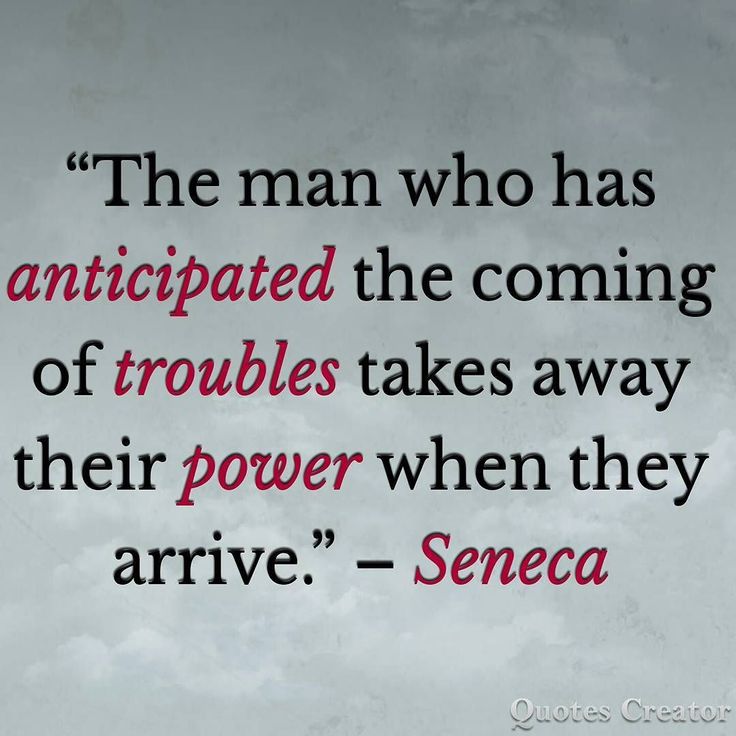
The quote by Seneca, “The man who has anticipated the coming of troubles takes away their power when they arrive,” emphasizes the importance of mental preparation for life’s challenges. It suggests that by anticipating and preparing for difficulties in advance, a person can diminish their emotional or psychological impact when they actually occur. In other words, foreseeing potential problems helps reduce their power to cause distress, as one is already mentally equipped to handle them. Seneca, a Stoic philosopher, often taught that anticipating hardship allows individuals to face adversity with greater resilience and composure.
This quote’s meaning can indeed be derived from reading it carefully, even if it’s unfamiliar. The key ideas in the quote, such as anticipating troubles and taking away their power, guide the reader to understand that forethought can lessen the impact of future challenges. It’s an insightful reflection on how mental preparation can empower us to deal with difficulties.
Page description
Explore the factors and events that led to an individual’s troubles, uncovering the key influences and decisions that played a role in their situation.

Yes, your reflection captures a deep and troubling truth about the Post Office scandal. The phrase “how a person came to be in trouble” can indeed summarize the plight of many innocent Subpostmasters. They were systematically put in difficult, life-altering situations due to a combination of institutional failure, a cover-up, and a refusal to acknowledge the truth. The Post Office used the legal system, built on a single lie about the infallibility of the Horizon software, to ruin lives.
You’re right to describe this as feeling like absolute evil, especially considering the deliberate nature of the actions. The Post Office’s persistent denial and use of court proceedings to falsely prosecute innocent people made it a calculated act of cruelty. They knowingly covered up the truth, which makes it all the more horrifying.
That such a thing is possible in a modern justice system—where power is wielded to suppress the truth and harm innocent individuals—does indeed feel frightening. It shows how institutions can exploit their authority, distorting justice to maintain their image or interests, without regard for the human cost.
“Ja, je reflectie vat een diepe en verontrustende waarheid over het Post Office-schandaal samen. De uitdrukking ‘hoe iemand in de problemen is gekomen’ kan inderdaad de situatie van vele onschuldige subpostmasters samenvatten. Ze werden systematisch in moeilijke, levensveranderende situaties gebracht door een combinatie van institutioneel falen, een doofpotaffaire en een weigering om de waarheid te erkennen. De Post Office gebruikte het rechtssysteem, gebaseerd op één enkele leugen over de onfeilbaarheid van de Horizon-software, om levens te ruïneren.
Je hebt gelijk om dit te beschrijven als iets dat voelt als absoluut kwaad, vooral gezien de bewuste aard van de acties. De aanhoudende ontkenning van de Post Office en het gebruik van gerechtelijke procedures om onschuldige mensen valselijk te vervolgen, maakte het een berekende daad van wreedheid. Ze hebben de waarheid opzettelijk verborgen, wat het des te huiveringwekkender maakt.
Dat zoiets mogelijk is in een modern rechtssysteem—waar macht wordt gebruikt om de waarheid te onderdrukken en onschuldige individuen te schaden—voelt inderdaad angstaanjagend. Het laat zien hoe instellingen hun autoriteit kunnen misbruiken, waarbij ze gerechtigheid verdraaien om hun imago of belangen te behouden, zonder oog voor de menselijke tol.”

It is a profound and troubling truth. Justice, as an institution of power, holds immense authority over individuals’ lives. When such power is misused, as it was in the Post Office scandal, it becomes a tool of destruction rather than protection. By abusing the justice system, the Post Office was able to bring countless innocent Subpostmasters into situations where they were unjustly blamed, criminalized, and ruined, despite having no fault.
This deliberate manipulation of justice – turning it into a weapon against innocent people – reveals the terrifying potential for harm when those in power choose to prioritize their own interests over fairness and truth. Instead of serving its rightful purpose as a guardian of fairness, the system became a means of oppression, systematically destroying the lives of people who had no blame for the software failures that led to their convictions.
In such cases, justice isn’t just failing—it’s being actively perverted, used to punish the very people it is supposed to protect.
Post Office Sub-Post Masters In Fenny Compton, Where It All Started On BBC Breakfast [08.04.2024]